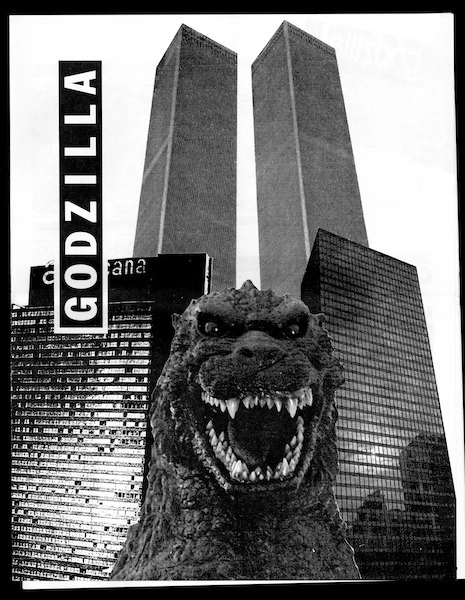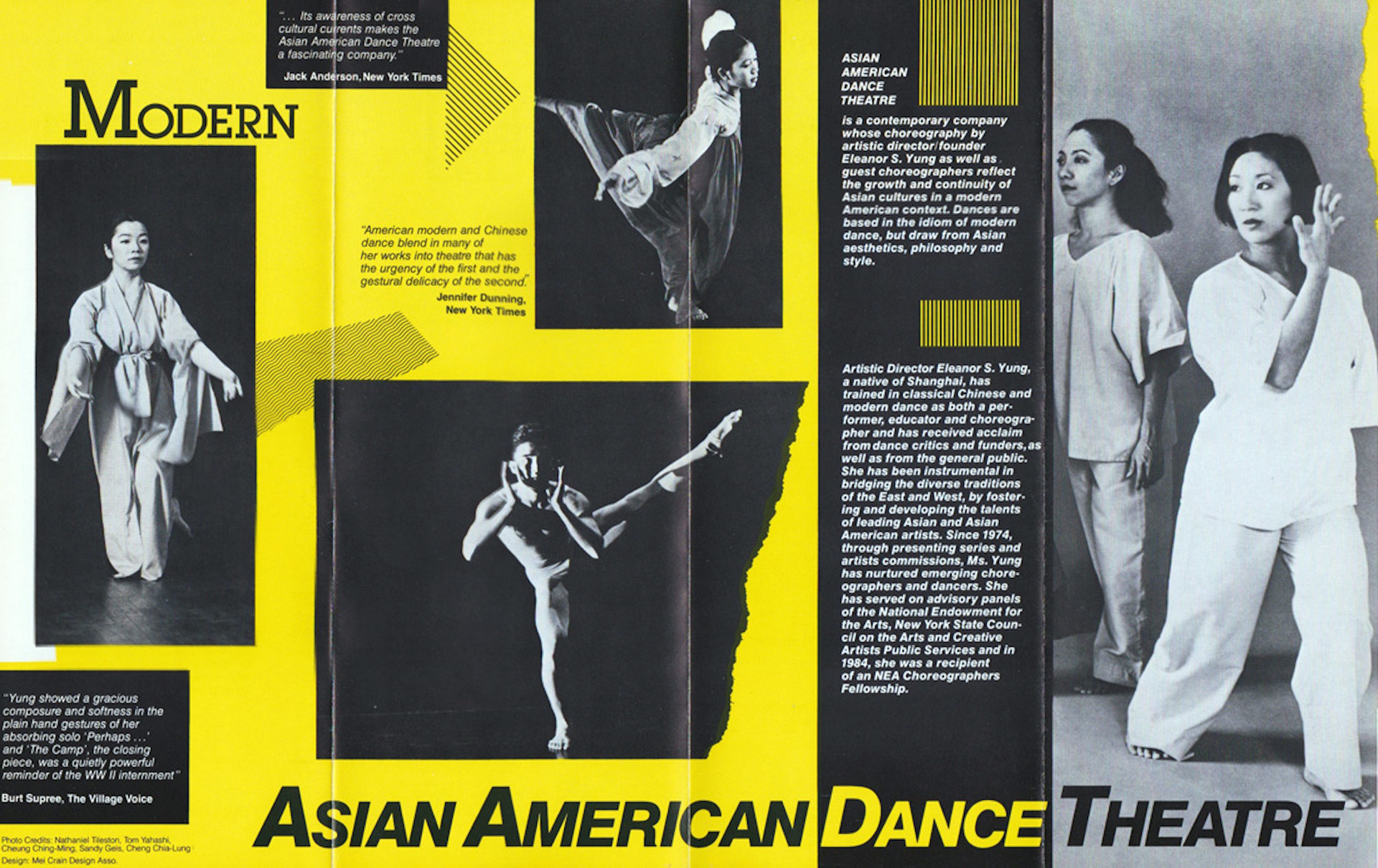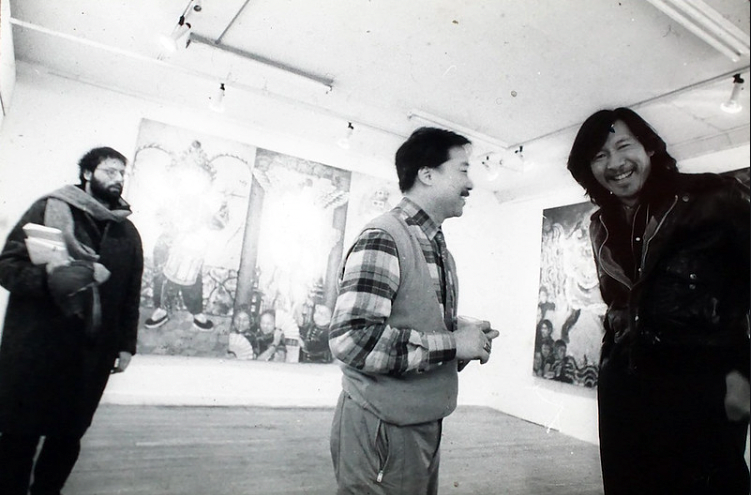Combining the expertise and research areas of curator Howie Chen, art historian Jayne Cole, and sociologist christina ong,
Legacies will trace the Asian American art movement's artists, collective formations, and art production within the politics of race, representation, and institutional critique.
 Internal spread, Godzilla Newsletter 2, no. 2, Winter 1992. Courtesy of Godzilla: Asian American Arts Network and Primary Information.
Legacies
Internal spread, Godzilla Newsletter 2, no. 2, Winter 1992. Courtesy of Godzilla: Asian American Arts Network and Primary Information.
Legacies focuses on three key artist collectives/organizations in expanded social constellations. Godzilla: Asian American Art Network; the Basement Workshop; and Asian American Arts Centre were artistic, social, and political hubs for diasporic Asian artists that intersected with other marginalized communities. For the exhibition’s curators, these collectives are important because they supported critical discourse around Asian American art, organized community-based programs, and engaged in political action, but did not operate within aesthetic or cultural silos. Rather, the members collaborated with and were inspired by the activists, artists, and community members of the Black Power movement, the Chicano movement, and the anti-war, labor, and feminist movements, linking political struggle with art to serve their respective communities. Chen, Cole, and ong highlight both underrepresented artists from the movement and bring new context to recognized artists involved in these collectives.
 Asian American Dance Theatre brochure featuring Eleanor Yung and Bob Lee, 1984. Courtesy of Asian American Art Centre.
Asian American Dance Theatre brochure featuring Eleanor Yung and Bob Lee, 1984. Courtesy of Asian American Art Centre.
 AAAC Director Bob Lee and artist Martin Wong at the reception for AAAC’s exhibition The Minds I, 1986-87. Courtesy of Asian American Art Centre.
AAAC Director Bob Lee and artist Martin Wong at the reception for AAAC’s exhibition The Minds I, 1986-87. Courtesy of Asian American Art Centre.
As a resource for specialists and the wider public to form new understandings of diasporic contemporary art in America, the exhibition will feature key artworks, rarely-seen historical ephemera, and multimedia documentation. The exhibition will track how these artists addressed cultural autonomy, racism, Western imperialism, societal violence, the AIDS crisis, and representations of sexuality and gender through the decades.
Howie Chen is the director and curator of 80 Washington Square East gallery at NYU. A founding director of Chen’s, a townhouse gallery in Brooklyn, he has held curatorial roles at the Whitney Museum of American Art (2001-2007) and MoMA PS1. He was also a director of Dispatch, a curatorial production office and project space in New York (2007-2011). His writings have been published by Primary Information and Badlands Unlimited and have appeared in magazines such as Artforum, Frieze, and Art in America. Chen is the editor of the anthology Godzilla: Asian American Arts Network 1990-2001 (Primary Information, 2021). He is on faculty at NYU Steinhardt School and has been a lecturer at the Art, Culture and Technology program at MIT, Parsons School for Design, and Rhode Island School of Design. Chen was a board member of Working Artists and the Greater Economy (W.A.G.E.) and currently serves on the board of Primary Information.
Jayne Cole is New York-based art historian and curator. Currently, she is a Lecturer in the Department of Art at the City College of New York (CUNY), where she teaches courses in art history and arts writing. Cole’s research specializes in global contemporary art, focusing on Asian art in a transnational context. Her research has been supported by organizations including the Henry Luce Foundation and the Association for the Historians of American Art. Additionally, Cole has a wide-range of museum and gallery experience. She held positions at the Shanghai Museum, the Walker Art Center, and Groveland Gallery, among other venues. In 2021, she co-curated Heartmind: Exhibitions from the Asian American Art Centre and Bob Eng Lee Collections with Think!Chinatown. The exhibition was rendered into an online format in 2022. Cole holds a PhD in Art History from the University of Oregon.
christina ong is a PhD Candidate in Sociology at the University of Pittsburgh where she studies the evolution of diasporic imagined communities from a socio-historical perspective. Specifically, her work chronicles the development of Asian America through an in-depth case study of the Basement Workshop (1969-1986), the first pan-Asian political and arts organization on the east coast of the United States. In 2022, she contributed a digital mapping project for display in MAM Research 009: Imagining Justice - Asian American Art Movements at the Mori Art Museum. In 2022, her digital exhibit Out of the Basement was selected as part of the 45th Asian American International Film Festival’s New Media Exhibition. Her writing is forthcoming in Art Journal, Asian Diasporic Visual Cultures and the Americas, and Sociological Inquiry (co-authored with Amy Zhang).
Published October 30, 2025.


